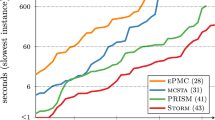Abstract
We show that stopwatch automata are equivalent with timed shuffle expressions, an extension of timed regular expressions with the shuffle operation. Since the emptiness problem is undecidable for stopwatch automata, and hence also for timed shuffle expressions, we introduce a decidable subclass of stopwatch automata called partitioned stopwatch automata. We give for this class an equivalent subclass of timed shuffle expressions and investigate closure properties by showing that partitioned stopwatch automata are closed under union, concatenation, star, shuffle and renaming, but not under intersection. We also show that partitioned stopwatch automata are equivalent with distributed time-asynchronous automata, which are asynchronous compositions of timed automata in which time may evolve independently.
Similar content being viewed by others
References
Abdeddaïm Y., Asarin E., Maler O.: Scheduling with timed automata. Theor. Comput. Sci. 354(2), 272–300 (2006)
Akshay, S., Bollig, B., Gastin, P., Mukund, M., Narayan Kumar K.: Distributed timed automata with independently evolving clocks. In: Proceedings of the 19th International Conference on Concurrency Theory (CONCUR 2008), volume 5201 of Lecture Notes in Computer Science, pp. 82–97. Springer, Berlin (2008)
Asarin, E., Caspi, P., Maler, O.: A Kleene theorem for timed automata. In: Proceedings of the 12th International Symposium in Logic in Computer System (LICS’97), pp. 160–171. IEEE Computer Society Press, Silver Spring (1997)
Asarin E., Caspi P., Maler O.: Timed regular expressions. J. Assoc. Comput. Mach. 49, 172–206 (2002)
Alur R., Dill D.L.: A theory of timed automata. Theor. Comput. Sci. 126, 183–235 (1994)
Abdeddaïm, Y., Maler, O.: Job-shop scheduling using timed automata. In: Proceedings of the 13th International Conference on Computer-Aided Verification (CAV’01), volume 2102 of Lecture Notes in Computer Science, pp. 478–492. Springer, Berlin (2001)
Abdeddaïm, Y., Maler, O.: Preemptive job-shop scheduling using stopwatch automata. In: Proceedings of the 8th International Conference on Tools and Algorithms for the Construction and Analysis of Systems (TACAS’02), volume 2280 of Lecture Notes in Computer Science, pp. 113–126. Springer, Berlin (2002)
Baier C., Katoen J.-P.: Principles of Model Checking. MIT Press, Cambridge (2008)
Bérard, B., Haddad, S.: Interrupt timed automata. In: Proceedings of FoSSaCS’09, volume 5504 of Lecture Notes in Computer Science, pp. 197–211. Springer, Berlin (2009)
Bouyer, P., Petit, A.: Decomposition and composition of timed automata. In: Proceedings of ICALP’99, volume 1644 of LNCS, pp. 210–219 (1999)
Bouyer P., Dufourd C., Fleury E., Petit A.: Updatable timed automata. Theor. Comput. Sci. 321(2–3), 291–345 (2004)
Bouyer P., Petit A.: A kleene/büchi-like theorem for clock languages. J. Autom. Lang. Comb. 7(2), 167–186 (2001)
Bouyer P., Petit A., Thérien D.: An algebraic approach to data languages and timed languages. Inf. Comput. 182(2), 137–162 (2003)
Clarke E., Grumberg O., Peled D.: Model Checking. MIT Press, Cambridge (1999)
Dima, C.: Kleene theorems for event-clock automata. In: Proceedings of FCT’99, volume 1684 of LNCS, pp. 215–225 (1999)
Dima C.: Real-time automata. J. Autom. Lang. Comb. 6, 3–23 (2001)
Dima, C.: A nonarchimedian discretization for timed languages. In: Proceedings of the First International Workshop on Formal Modelling and Analysis of Timed Systems (FORMATS’03), volume 2791 of Lecture Notes in Computer Science, pp. 161–181. Springer, Berlin (2003)
Dima, C.: Timed shuffle expressions. In: Proceedings of the 16th International Conference on Concurrency Theory (CONCUR’05), volume 3653 of Lecture Notes in Computer Science, pp. 95–109. Springer, Berlin (2005)
Dima, C.: Positive and negative results on the decidability of the model-checking problem for an epistemic extension of timed ctl. In: Proceedings of TIME’09, pp. 29–36. IEEE Computer Society, Silver Spring (2009)
Dima, C., Lanotte, R.: Distributed time-asynchronous automata. In: Proceedings of the 4th International Colloquium on Theoretical Aspects of Computing (ICTAC 2007), volume 4711 of Lecture Notes in Computer Science, pp. 185–200. Springer, Berlin (2007)
Demichelis, F., Zielonka, W.: Controlled timed automata. In: Proceedings of CONCUR’98, volume 1466 of Lecture Notes in Computer Science, pp. 455–469. Springer, Berlin (1998)
Fersman E., Krcál P., Pettersson P., Yi W.: Task automata: schedulability, decidability and undecidability. Inf. Comput. 205(8), 1149–1172 (2007)
Fersman E., Mokrushin L., Pettersson P., Yi W.: Schedulability analysis of fixed-priority systems using timed automata. Theor. Comput. Sci. 354(2), 301–317 (2006)
Henzinger T.A., Kopke P.W., Puri A., Varaiya P.: What’s decidable about hybrid automata. J. Comput. Syst. Sci. 57, 94–124 (1998)
Henzinger, T.A., Raskin, J.-F., Schobbens, P.-Y.: The regular real-time languages. In: Proceedings of 25th International Conference on Automata, Logics and Programming (ICALP’98), volume 1443 of Lecture Notes in Computer Science, pp. 580–591. Springer, Berlin (1998)
Krishnan P.: Distributed timed automata. Electron. Notes Theor. Comput. Sci. 28, 5–21 (2000)
Ouaknine, J., Worrell, J.: Revisiting digitization, robustness, and decidability for timed automata. In: Proceedings of the 18th International Symposium in Logic in Computer System (LICS’03), pp. 198–207. IEEE Computer Society Press, Silver Spring, (2003)
Pandya, P.K., Hung, D.V.: Duration calculus of weakly monotonic time. In: Proceedings of FTRTFT’98, volume 1486 of Lecture Notes in Computer Science, pp. 55–64. Springer, Berlin (1998)
Wilke, T.: Specifying timed state sequences in powerful decidable logics and timed automata. In: Proceedings of FTRTFT’94, volume 863 of LNCS, pp. 694–715 (1994)
Wozna, B., Lomuscio, A.: A logic for knowledge, correctness, and real time. In: Proceedings of CLIMA V, volume 3487 of Lecture Notes in Computer Science, pp. 1–15. Springer, Berlin (2005)
Yovine, S. Model-checking timed automata. In: Lectures on Embedded Systems, volume 1494 of Lecture Notes in Computer Science, pp. 114–152. Springer, Berlin (1998)
Zielonka W.: Notes on finite asynchronous automata. Inf. Théor. Appl. 21(2), 99–135 (1987)
Author information
Authors and Affiliations
Corresponding author
Rights and permissions
About this article
Cite this article
Dima, C., Lanotte, R. A study on shuffle, stopwatches and independently evolving clocks. Distrib. Comput. 25, 5–33 (2012). https://doi.org/10.1007/s00446-011-0148-2
Received:
Accepted:
Published:
Issue Date:
DOI: https://doi.org/10.1007/s00446-011-0148-2




